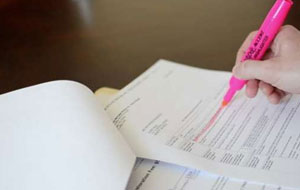Questions To Ask About Your Credit Score

The first step to getting your credit on track is knowing what your credit report tells banks about your financial history. Lenders base their decisions to extend a loan for a car or home based on what they find in this report, and if the numbers aren't good, it could mean that you end up with a higher interest rate or without financing for your latest purchase.
Obtaining your credit report is free, but you'll have to pay to purchase your credit score from one of the three major credit reporting agencies. Once you've pulled your credit report, ask these 5 questions to make sure your credit repair strategy is on track.
1. Do I have the right credit score?
There are a variety of credit scores, and many of them are estimates based on your credit report. All three credit reporting agencies - TransUnion, Equifax, and Experian - can produce a credit score using an algorithm developed by the Fair Isaac Corporation, or FICO. If you'd rather go straight to the source, you can obtain a credit score from FICO inexpensively using their website.
2. Is my credit score good, bad, or average?
Once you've gotten your credit score, you've got to know what it means for your creditworthiness. Credit scores range from 300 to 850, but the average American's FICO score is 689, which is considered a "fair" score. Experts consider credit scores under 500 to be bad, and and scores over 750 to be excellent. It's likely that your number falls somewhere in the middle, but the lower the number, the higher your interest rate and likelihood for a denial.
3. Is my credit score based on accurate information?
If your credit score seems a little low, it could be based on inaccurate information. Sometimes, banks don't do a great job of reporting your on-time payments to the credit agency or removing accounts that have been paid in full. If you notice errors on your credit report, you can petition the credit agencies to investigate and hopefully remove them. Just one inaccurate account on your credit history can seriously ding your score, so it's best to make sure everything is correct.
4. What are the most important parts of my credit history?
According to CreditCards.com, your FICO credit score is composed of 5 areas of your credit history. Payment history, or paying your bills on time and according to their terms, accounts for 35% of the overall score. Accounting for 30% is your "credit utilization," or your amount of current debt. Length of credit history accounts for 15% of the score, and the types of credit (like installment loans or revolving credit) and new accounts each account for 10%.
5. When do I need to seek professional credit repair?
If you're unable to pay your bills on time and your credit score is preventing you from taking out loans that you need, you likely need professional credit counseling or repair. Credit counseling can also be beneficial when you're looking to take out a large loan, like financing for a new car or home. The professional credit experts can help you improve your score, likely saving you money in the long-term.
The credit score is a numerical representation of all the individual parts of your credit history, but it may not be as clear as you think. A credit expert can help you decode your score and what it means for your financial future, particularly if your rating isn't considered above-average.
